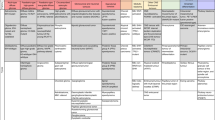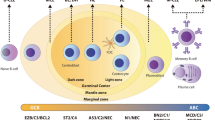Abstract
Patients with germline PTEN mutations are at high risk of developing benign and malignant tumours. We aimed to evaluate the cumulative risk of several types of cancer and of dysplastic cerebellar gangliocytoma (Lhermitte-Duclos disease, LDD). In addition, genotype–phenotype correlations in PTEN hamartoma tumour syndrome (PHTS) were assessed. Data on patients with PTEN mutations were collected from clinical genetic centres in Western Europe, Australia, and the USA. The cumulative risk of developing cancers of the breast, thyroid, endometrium, skin, kidneys, colorectum, and lungs, and also LDD was calculated by Kaplan–Meier methods. Associations between mutations and cancer were assessed by Chi square means. A total of 180 germline PTEN mutation carriers, 81 males (45 %), from nine countries were included. The cumulative risk of developing any cancer and/or LDD at age 60 was 56 % for males and 87 % for females (p = 0.001). Females had significant higher risks of developing breast cancer, thyroid cancer, and LDD than males. The only genotype–phenotype correlation identified was a lower frequency of thyroid cancer in patients with missense mutations (p = 0.014). In conclusion, PHTS patients, particularly females, have a substantial risk of developing one or more tumours from a broad tumour spectrum. Major genotype–phenotype associations could not be identified.


Similar content being viewed by others
References
Eng C (2011) PTEN Hamartoma tumor syndrome (PHTS). In: Pagon RA, Bird TD, Dolan CR, Stephens K, (eds) GeneReviews [Internet]. Seattle (WA): University of Washington, Seattle; 1993–2001 Nov 29 [updated 2011 Jul 21]
Lachlan KL, Lucassen AM, Bunyan D, Temple IK (2007) Cowden syndrome and Bannayan-Riley-Ruvalcaba syndrome represent one condition with variable expression and age-related penetrance: results of a clinical study of PTEN mutation carriers. J Med Genet 44:579–585
Riegert-Johnson DL, Gleeson FC, Roberts M, Tholen K, Youngborg L, Bullock M, Boardman LA (2010) Cancer and Lhermitte-Duclos disease are common in Cowden syndrome patients. Hered Cancer Clin Pract 8:6
Tan MH, Mester JL, Ngeow J, Rybicki LA, Orloff MS, Eng C (2010) Lifetime cancer risks in individuals with germline PTEN mutations. Clin Cancer Res 18:400–407
Bonneau D, Longy M (2000) Mutations of the human PTEN gene. Hum Mut 16:109–122
Zhang S, Yu D (2010) PI (3) king apart PTEN’s role in cancer. Clin Cancer Res 16:4325–4330
Patnaik MM, Raza SS, Khambatta S, Stanich PP, Goetz MP (2010) Oncophenotypic review and clinical correlates of phosphatase and tensin homolog on chromosome 10 hamartoma tumor syndrome. J Clin Oncol 28:e767–e768
Wang H, Karikomi M, Naidu S, Rajmohan R, Caserta E, Chen HZ, Rawahneh M, Moffitt J, Stephens JA, Fernandez SA, Weinstein M, Wang D, Sadee W, La Perle K, Stromberg P, Rosol TJ, Eng C, Ostrowski MC, Leone G (2010) Allele-specific tumor spectrum in Pten knockin mice. Proc Natl Acad Sci USA 107:5142–5147
Alimonti A, Carracedo A, Clohessy JG, Trotman LC, Nardella C, Egia A, Salmena L, Sampieri K, Haveman WJ, Brogi E, Richardson AL, Zhang J, Pandolfi PP (2010) Subtle variations in Pten dose determine cancer susceptibility. Nat Genet 42:454–458
Tan MH, Mester J, Peterson C, Yang Y, Chen JL, Rybicki LA, Milas K, Pederson H, Remzi B, Orloff MS, Eng C (2011) A clinical scoring system for selection of patients for PTEN mutation testing is proposed on the basis of a prospective study of 3042 probands. Am J Hum Genet 88:42–56
Hollander MC, Blumenthal GM, Dennis PA (2011) PTEN loss in the continuum of common cancers, rare syndromes and mouse models. Nat Rev Cancer 11:289–301
Vlietstra RJ, van Alewijk DC, Hermans KG, van Steenbrugge GJ, Trapman J (1998) Frequent inactivation of PTEN in prostate cancer cell lines and xenografts. Cancer Res 58:2720–2723
Nowak DA, Trost HA (2002) Lhermitte-Duclos disease (dysplastic cerebellar gangliocytoma): a malformation, hamartoma, or neoplasm? Acta Neurol Scand 105:137–145
Lok C, Viseux V, Avril MF, Richard MA, Gondry-Jouet C, Deramond H, Desfossez-Tribout C, Courtade S, Delaunay M, Piette F, Legars D, Dreno B, Saïag P, Longy M, Lorette G, Laroche L, Caux F, Cancerology Group of the French Society of Dermatology (2005) Brain magnetic resonance imaging in patients with Cowden syndrome. Medicine (Baltimore) 84:129–136
Laury AR, Bongiovanni M, Tille JC, Kozakewich H, Nosé V (2011) Thyroid pathology in PTEN-hamartoma tumor syndrome: characteristic findings of a distinct entity. Thyroid 21:135–144
Orloff MS, Eng C (2008) Genetic and phenotypic heterogeneity in the PTEN hamartoma tumour syndrome. Oncogene 41:5387–5397
www.nccn.org, Clinical practice guidelines in oncology: genetic/familial high-risk assessment: breast and ovarian, version 1.2011
LoPicollo J, Ballas MS, Dennis PA (2007) PTEN hamartomatous tumor syndromes (PHTS): rare syndromes with great relevance to common cancers and targeted drug development. Crit Rev Oncol Hematol 63:203–214
Iacobas I, Burrows PE, Adams DM, Sutton VR, Hollier LH, Chintagumpala MM (2011) Oral rapamycin in the treatment of patients with hamartoma syndromes and PTEN mutation. Pediatr Blood Cancer 57:321–323
Zhou XP, Marsh DJ, Morrison CD, Chaudhury AR, Maxwell M, Reifenberger G, Eng C (2003) Germline inactivation of PTEN and dysregulation of the phophoinositol-3-kinase/Akt pathway cause human Lhermitte-Duclos disease in adults. Am J Hum Genet 73:1191–1198
Conflict of interest
The authors declare that they have no conflict of interest.
Author information
Authors and Affiliations
Corresponding author
Additional information
Noralane M. Lindor formerly with Medical Genetics, Mayo Clinic, Rochester, MN, USA.
Rights and permissions
About this article
Cite this article
Nieuwenhuis, M.H., Kets, C.M., Murphy-Ryan, M. et al. Cancer risk and genotype–phenotype correlations in PTEN hamartoma tumor syndrome. Familial Cancer 13, 57–63 (2014). https://doi.org/10.1007/s10689-013-9674-3
Published:
Issue Date:
DOI: https://doi.org/10.1007/s10689-013-9674-3




